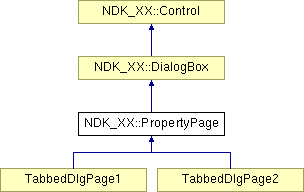
#include <ndk++.h>
Inheritance diagram for NDK_XX::PropertyPage:

Public Methods | |
| PropertyPage (PropertyDialog *parent, int id, const string &title,int lines, int cols, int y=0, int x=0) | |
| ~PropertyPage () | |
| int | refresh () |
Protected Methods | |
| int | process_key (int key) |
| Non-modal equivalent of do_modal(). | |
| int | driver (int key) |
| void | do_initial_update () |
| Non-modal wrapper for calling on_dlg_init from the constructor. | |
| void | on_dlg_init () |
| We redefine here so we get called on construction. | |
| void | on_cmd (int dlg_req) |
| Kind of catch-all for derived windows. | |
| virtual void | on_page_change () |
| Called when some control change. | |
| virtual void | on_apply () |
| called by parent when user pushes the "Apply" button | |
| void | create_buttons () |
| called on construction of dialog | |
Protected Attributes | |
| PropertyDialog * | pDialog |
Friends | |
| class | Tab |
| class | PropertyDialog |
|
||||||||||||||||||||||||||||||||
|
DialogBox Constructor
Definition at line 1864 of file ndk++.h. References NDK_XX::Tab::pPage.
01868 {
01869 // send_to_log("hide en Tab")<< pPage->get_text()<< endl;
01870 if(is_visible())
|
|
|
Definition at line 1871 of file ndk++.h. References NDK_XX::Tab::pPage.
01876 { return pPage;}
|
|
|
called on construction of dialog
Reimplemented from NDK_XX::DialogBox. Definition at line 1921 of file ndk++.h. References NDK_XX::PropertyDialog::pages. Referenced by TabbedDlgPage2::on_dlg_init().
01922 {return (page < pages.size() && page > -1);}
01923
|
|
|
Non-modal wrapper for calling on_dlg_init from the constructor.
Definition at line 1897 of file ndk++.h. Referenced by NDK_XX::DialogBox::end_dialog(), TabbedDlgPage1::TabbedDlgPage1(), and TabbedDlgPage2::TabbedDlgPage2().
01897 : 01898 /** 01899 PropertyDialog Constructor 01900 @param id 01901 a user defined const int identifying this window @param lines: |
|
|
get a chance at processing the key, before parent does Reimplemented from NDK_XX::DialogBox. Definition at line 1894 of file ndk++.h. Referenced by process_key().
01895 : public DialogBox |
|
|
called by parent when user pushes the "Apply" button
Definition at line 1916 of file ndk++.h. References NDK_XX::PropertyDialog::curr_page.
01919 { return curr_page;}
|
|
|
Kind of catch-all for derived windows.
Reimplemented from NDK_XX::DialogBox. Definition at line 2537 of file ndk++.cc. References NDK_XX::DialogBox::bContinueModal, and NDK_XX::Control::clicked_inside(). Referenced by process_key().
02538 {
02539 switch(key) {
02540 #ifdef NCURSES_MOUSE_VERSION
02541 case KEY_MOUSE:
02542 {
02543 MEVENT event;
02544 getmouse(&event);
02545 int ry = event.y, rx = event.x; /* screen coordinates */
02546 if (mouse_trafo(&ry,&rx,FALSE)){
02547 if((event.bstate & ( BUTTON1_CLICKED|
02548 BUTTON1_DOUBLE_CLICKED|
02549 BUTTON1_TRIPLE_CLICKED))
02550 && !clicked_inside(ry, rx)){
02551 // we react only if the click was in the userwin, that means
02552 // inside the menu display area or at the decoration window.
02553 bContinueModal=false;
02554 }
02555 }
02556 break;
02557 }
02558 #endif
02559 default: break;
02560 }
02561 }
|
|
|
We redefine here so we get called on construction.
Reimplemented from NDK_XX::DialogBox. Reimplemented in TabbedDlgPage1, and TabbedDlgPage2. Definition at line 1904 of file ndk++.h.
01919 { return curr_page;}
|
|
|
Called when some control change.
Definition at line 1910 of file ndk++.h. References NDK_XX::Control::title. Referenced by TabbedDlgPage2::on_clear_list(), TabbedDlgPage2::on_remove(), and TabbedDlgPage2::on_sel_change().
01919 { return curr_page;}
|
|
|
Non-modal equivalent of do_modal().
Definition at line 2504 of file ndk++.cc. References NDK_XX::DialogBox::bContinueModal, driver(), NDK_XX::DialogBox::next_control(), on_cmd(), NDK_XX::DialogBox::prev_control(), refresh(), NDK_XX::DialogBox::REQ_DLG_DOWN, NDK_XX::DialogBox::REQ_DLG_EXIT, NDK_XX::DialogBox::REQ_DLG_LEFT, NDK_XX::DialogBox::REQ_DLG_NEXT, NDK_XX::DialogBox::REQ_DLG_PREV, NDK_XX::DialogBox::REQ_DLG_RIGHT, and NDK_XX::DialogBox::REQ_DLG_UP. Referenced by NDK_XX::Tab::driver().
02505 {
02506 refresh();
02507 bContinueModal=true;
02508 int req=REQ_DLG_EXIT;
02509 do{
02510 #ifdef NCURSES_MOUSE_VERSION
02511 if(key == KEY_MOUSE){
02512 req=driver(key);
02513 key=0;
02514 }
02515 else
02516 #endif /* NCURSES_MOUSE_VERSION */
02517
02518 req=driver(getch());
02519 switch(req){
02520 case REQ_DLG_EXIT:
02521 case REQ_DLG_UP:
02522 case REQ_DLG_DOWN:
02523 bContinueModal=false;break;
02524 case REQ_DLG_RIGHT:
02525 case REQ_DLG_NEXT: next_control(); break;
02526
02527 case REQ_DLG_LEFT:
02528 case REQ_DLG_PREV: prev_control(); break;
02529 default: on_cmd(req); break;
02530 }
02531 } while( bContinueModal);
02532 return req;
02533 }
|
|
|
Since we have the dialogs stacked and they are not modal, we need to do this manually Definition at line 1875 of file ndk++.h. References NDK_XX::Tab::pPage. Referenced by NDK_XX::Tab::activate(), and process_key().
01876 { return pPage;}
01877 ///Set the page associated with this tab
01878 void set_page(PropertyPage *page){pPage = page;}
01879
01880 void set_text(const string &txt);
01881
01882 protected:
01883 ///The stacked dialog we manage
|
|
|
|
|
|
|
|
|
Do nothing, otherwise OK shows up... Definition at line 1925 of file ndk++.h. Referenced by NDK_XX::DialogBox::end_dialog(). |
 1.2.17
1.2.17